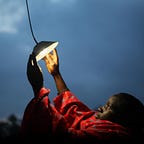Since the UN wrote its goals in 2015, the term Sustainable Development has moved farther from its academic definition and into the common lexicon where, in the private sector, it’s become a marketing panacea and an often meaningless tenant of CSR. In aid and publicly funded projects, sustainability is a score on a rubric, a requisite to funding that will dry up when agendas change.
At Pawame, sustainability is our core business, not an add-on, not marketing. Not a “lens” through which we’ll stop looking when our funders change.
We sell solar home systems in Sub-Saharan Africa, and finance them on a lease-to-own basis, while tracking customers’ repayment histories and building credit that can unlock access to financing for other life-enhancing products. We’re thinking about how the next billion come online. We’re offering climate-smart, solar-enabled products that don’t just mitigate the effects of climate change — they help our customers adapt to the effects that they’re already experiencing, especially in the dry northern counties of Kenya where we work. Our product pipeline, including solar water pumps and water tanks will become increasingly critical as climates change.
Excellent, we might conclude: our work almost perfectly fits the Brundtland definition of Sustainable Development from which the sustaina-craze has emerged:
“Sustainable development is development that meets the needs of the present without compromising the ability of future generations to meet their own needs.”
At Pawame, this isn’t enough. Our business needs to be financially sustainable. In 2019, we will attain cash flow break-even. We realize that we are not meeting the needs of future generations if we cannot prove ourselves durable enough for the free market, and thereby prove the financial viability of the off-grid solar experiment. Which is why for the past year we’ve been intently focused on achieving cash flow break-even (CFBE), a goal we will attain in 2019.
Though the off-grid energy market remains less than 5% penetrated in SubSaharan Africa, we are a part of a growing industry of off-grid solar companies. Together we constitute a kind of grand trial to prove that this business model is not just environmentally sustainable, but is one that can survive on its own in the African economy. Across the industry, CFBE has remained difficult to achieve. Operations are expensive and have often depended on influxes of cash from impact VCs, aid agencies, development finance institutions, corporations, and other private investors not just to grow, but to stay afloat.
We do need this kind of cash to grow, expand to new regions, and pilot new products, but in 2019, we will operationally break even. Our work is not an aid project; our funding will not dry up when the capricious political aims of some far-off foreign policy agenda change and we don’t need to market sustainability. We embody it. CFBE is part of that.
To help with this, we’ve brought on extra corporate development support. After 6+ years at Bain & Co., Hugo Debot has joined the team as the Head of Corporate Development and he’ll be responsible for the CFBE strategy, program, and launch. He will support project managers in delivering their projects with scope and on time. Hugo holds a master’s degree in engineering and an MBA from INSEAD. Through Ernst and Young’s Ripples Program, Robert Veiga, will be here for three months in a consulting role to help develop a growth strategy and to craft a plan to achieve operational excellence.
Much has been made of the economic opportunities on the African continent and in off-grid solar. We’re excited to be a small part of proving the research right — and making sustainability — financially sustainable.
